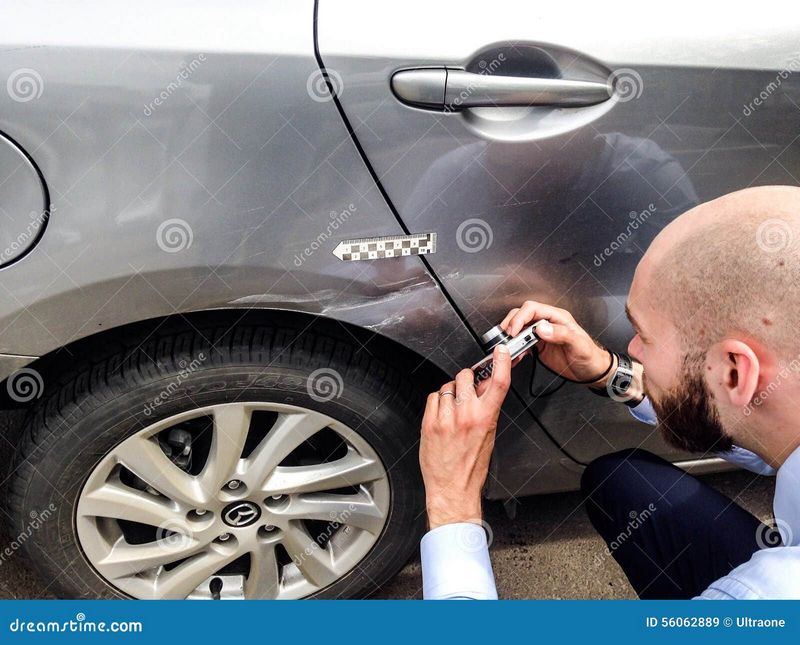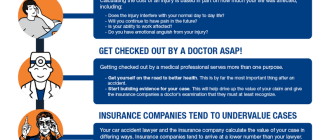
Disagreeing with Your Car Insurance Adjuster: Steps to Take.
When it comes to car insurance, disagreements with your insurance adjuster can sometimes arise. Whether it’s a dispute over coverage, damages, or the value of your vehicle, it’s important to know the steps to take in order to resolve the issue. By following these steps, you can better navigate the process and ensure a fair outcome.
1. Review your policy: The first step is to carefully review your car insurance policy. Understand what is covered and what is not, as well as any limits or deductibles that may apply. This will give you a clearer picture of what you can expect from your insurance company.
2. Document the damage: If you disagree with the adjuster’s assessment of the damage to your car, it’s essential to document the damage yourself. Take detailed photographs and notes, and gather any other evidence that supports your claim. This will help strengthen your case and provide a clear record of the damage.
3. Communicate with your adjuster: Reach out to your insurance adjuster and express your concerns. Be polite, but firm in stating your position and providing any evidence you have gathered. It’s important to maintain open lines of communication throughout the process.
4. Request a second opinion: If you still cannot come to an agreement with your adjuster, consider seeking a second opinion. Contact a trusted mechanic or appraiser to assess the damage and provide an independent evaluation. This could provide additional evidence to support your claim.
5. Consider mediation or arbitration: If all else fails, you may want to explore mediation or arbitration as a way to resolve the disagreement. These processes involve a neutral third party who can help facilitate a resolution without going to court.
Remember, it’s important to remain patient and persistent when disagreeing with your car insurance adjuster. By following these steps and advocating for yourself, you can work towards a resolution that is fair and reasonable.
Reasons to Disagree
When disagreeing with your car insurance adjuster, it’s important to have valid reasons to support your case. Here are some common reasons why you may choose to disagree with your insurance adjuster:
- Discrepancies in the accident report: If you notice any errors or inaccuracies in the accident report prepared by the adjuster, it’s crucial to bring them to their attention.
- Insufficient evaluation of damages: If you believe that the adjuster undervalued the cost of repairing your car or did not take into account certain damages, you have the right to challenge their assessment.
- Policy interpretation: In some cases, there may be a difference in interpreting the terms and conditions of your car insurance policy. If you believe the adjuster’s decision is not in line with your policy, you can dispute it.
- Unfair settlement offer: If the settlement offer provided by the insurance adjuster seems unjust or inadequate, you can push back and negotiate for a fairer amount.
- Disagreements over fault determination: If you disagree with the insurance adjuster’s determination of fault in the accident, you can present your own evidence, such as witness statements or camera footage.
Remember that it’s important to approach the disagreement process with clear and documented evidence to support your claims. Be prepared to present your case and negotiate with the insurance adjuster to reach a fair resolution.
Reviewing Your Policy
When you disagree with your car insurance adjuster, it’s important to take certain steps to resolve the issue. The first step is to review your car insurance policy to understand the coverage and limits. By familiarizing yourself with the details of your policy, you can have a better understanding of what is covered and what isn’t.
Take the time to carefully read through your policy document. Pay attention to the sections that outline the coverage for different types of damages, such as property damage, bodily injury, or theft. Additionally, make note of any exclusions or limitations that may apply to your policy.
If you’re having trouble understanding any part of your policy, don’t hesitate to reach out to your car insurance company or agent for clarification. They can explain the terms and conditions in a way that is easier to understand, helping you make sense of your coverage.
Reviewing your policy will give you the knowledge and confidence to negotiate with your car insurance adjuster. By knowing what you’re entitled to and what your policy covers, you can effectively communicate your concerns and disagreements. This can help you reach a resolution that is fair and satisfactory for both parties.
| 1. Review your policy |
| 2. Gather evidence |
| 3. Document all communications |
| 4. Seek a second opinion |
| 5. File a complaint if necessary |
In conclusion, reviewing your car insurance policy is a crucial step when disagreeing with your adjuster. It empowers you with the knowledge and understanding necessary to navigate the claims process effectively. By taking the time to review your policy, you can better protect your rights and ensure a fair outcome.
Collecting Evidence
When you disagree with your car insurance adjuster, it is important to have strong evidence to support your claim. Follow these steps to collect the necessary evidence:
- Take photos or videos of the accident scene: Capturing visual evidence of the damage to your car and any relevant road conditions or signage can provide valuable support for your case.
- Document the accident details: Write down the date, time, and location of the accident, as well as any eyewitness accounts or police reports.
- Gather medical records and bills: If you sustained any injuries in the accident, collect all medical documentation to demonstrate the extent of your damages.
- Keep records of vehicle repairs: Save receipts, invoices, and any other documentation related to the repairs done on your car following the accident.
- Obtain repair estimates: Get multiple repair estimates from reputable auto body shops to show the true cost of repairing your vehicle.
- Collect wage loss documentation: If the accident caused you to miss work, obtain documentation from your employer to prove your lost wages.
- Keep a journal: Record any pain, discomfort, or emotional distress you experienced as a result of the accident. This can be helpful in demonstrating the impact the accident had on your overall well-being.
By collecting and presenting strong evidence, you can better support your argument when disagreeing with your car insurance adjuster and increase the likelihood of a favorable outcome for your claim.
Documenting Damages
When you find yourself in a situation where you disagree with your car insurance adjuster, it’s important to take certain steps to protect yourself and ensure a fair resolution. One of the most crucial steps you can take is documenting any damages to your vehicle.
1. Take photos: Use your smartphone or camera to take clear, detailed photos of the damage to your car. Make sure to capture different angles and close-ups of any dents, scratches, or other visible damage.
2. Write down details: Take notes about the accident or incident that caused the damage. Include important details such as the date, time, location, and any other relevant information. This will help provide context for the damage and strengthen your case.
3. Keep records: Retain copies of any documents related to the damage, such as police reports, repair estimates, and medical bills (if applicable). These documents can serve as evidence in your favor if there is a dispute with your insurance company.
4. Obtain witness statements: If there were any witnesses to the accident or incident, ask them for their contact information and a brief statement describing what they saw. This can provide additional support to your claim if the adjuster questions the cause or extent of the damage.
5. Seek professional assessment: Consider getting an independent assessment of the damage from a trusted mechanic or auto body shop. Their expert opinion can carry more weight and help validate your claim if the adjuster disputes the extent of the damage or the cost of repairs.
6. Communicate in writing: When discussing the disagreement with your insurance adjuster, it’s best to communicate in writing whenever possible. This helps maintain a clear record of the conversations and any agreements or disagreements reached during the claims process.
By documenting the damages to your car, you provide solid evidence to support your case in the event of a disagreement with your insurance adjuster. These steps can help ensure a fair resolution and protect your rights as a policyholder.
Seeking a Second Opinion
If you disagree with the decision made by your car insurance adjuster, it is important to know that you have the right to seek a second opinion. This can be especially helpful if you believe that the adjuster’s assessment of the damages or the amount of compensation is incorrect. By seeking a second opinion, you can ensure that you are being treated fairly by your insurance company.
Here are some steps you can take when seeking a second opinion:
- Research reputable appraisers or adjusters: Look for professionals who have experience in assessing car damages and have a good reputation for providing fair estimates.
- Request quotes or assessments: Contact these professionals and provide them with the necessary information about your car and the damages. Ask for a detailed quote or assessment of the repairs needed and the estimated cost.
- Compare the assessments: Review the assessments provided by the different professionals and compare them with the one given by the insurance adjuster. Take note of any significant discrepancies in the evaluations of the damages and the estimated costs.
- Consult with legal advice: If you believe that the discrepancies are significant and that your insurance company is not treating you fairly, you may want to consult with a lawyer who specializes in car insurance claims. They can provide guidance on your rights and help you understand the best course of action.
- Communicate with your insurance company: Once you have gathered all the necessary information, communicate with your insurance company and express your concerns. Provide them with the assessments from the other professionals and explain why you believe their initial assessment was incorrect. Be prepared to negotiate and provide any additional evidence if necessary.
- Evaluate your options: After discussing your concerns with your insurance company, evaluate the options available to you. This may include accepting their final offer, filing a complaint with the insurance regulatory agency, or pursuing legal action if necessary.
Remember, seeking a second opinion is an important step to take if you disagree with your car insurance adjuster. It can help ensure that you receive the fair compensation you deserve for the damages to your vehicle.
Understanding the Scope
When you find yourself disagreeing with your car insurance adjuster, it is important to understand the scope of your insurance policy and what it covers. This will help you determine if your disagreement is valid and worth pursuing further.
The first step to take is to carefully review your car insurance policy. Look for any specific terms or conditions that may apply to your situation. Pay attention to the coverage limits and any exclusions that may be listed.
Next, gather all relevant documentation and evidence related to your claim. This may include photos of the damage, police reports, medical bills, and any other supporting documents. Having this information organized and readily available will help you clearly present your case to the adjuster.
It is also helpful to research your state’s laws regarding car insurance claims. This will give you a better understanding of your rights and responsibilities as a policyholder. If you discover that the adjuster is taking actions that are not in line with the law, you may have stronger grounds for disputing their decisions.
Lastly, consider seeking professional advice or assistance. An experienced insurance attorney or a public adjuster can provide guidance and help you navigate the process. They can review your case, advocate on your behalf, and help you negotiate with the insurance company.
By understanding the scope of your car insurance policy and taking these steps, you can better position yourself to successfully handle any disagreements with your insurance adjuster.
Reviewing the Adjuster’s Report
When disagreeing with your car insurance adjuster, it is important to carefully review their report in order to determine the basis of your disagreement. Here are the steps you should take:
- Obtain a copy of the adjuster’s report: Request a copy of the adjuster’s report from your insurance company. Make sure to read it thoroughly and highlight any areas where you think there may be discrepancies or errors.
- Check the accuracy of the information: Review all the details provided in the adjuster’s report, such as the description of the damage, the estimated costs of repairs, and any other relevant information. Check for any inaccuracies, missing details, or inconsistencies.
- Consult with an independent appraiser: If you have doubts about the accuracy of the adjuster’s report, consider seeking a second opinion from an independent appraiser. They can provide you with an unbiased assessment of the damage and the estimated costs of repairs.
- Gather supporting evidence: Collect any additional evidence that may support your claim. This can include photographs of the damage, repair estimates from reputable mechanics, or any other relevant documentation.
- Document your concerns: Make a list of the specific discrepancies or errors you have identified in the adjuster’s report. Clearly explain why you believe these issues are incorrect or unjustifiable.
By carefully reviewing the adjuster’s report and gathering supporting evidence, you will be better equipped to effectively address your disagreement with your car insurance adjuster.
Appraisals and Inspections
When you find yourself disagreeing with your car insurance adjuster, it may be necessary to pursue additional steps to resolve the issue. One such step is to request an appraisal or inspection of your vehicle.
An appraisal is a formal evaluation of your car’s value, typically conducted by a certified appraiser. This process involves assessing the condition of the vehicle, considering its age, mileage, and any pre-existing damage. The appraiser will examine the vehicle thoroughly and determine its fair market value.
On the other hand, an inspection involves a professional examination of the damages or repairs needed for your car. It can be conducted by an adjuster or an independent inspection service. The purpose of an inspection is to assess the extent of the damage and provide an estimate for the cost of repairs.
If you choose to pursue an appraisal or inspection, you should notify your car insurance adjuster and request the necessary forms or information. Depending on the circumstances, your insurance company may appoint an appraiser or adjuster to conduct the evaluation. Alternatively, you may be allowed to choose an independent appraiser or inspection service.
Once the appraisal or inspection is complete, you will receive a report detailing the findings and any recommended actions or repairs. This information can be used as evidence in negotiations with your car insurance company or in legal proceedings, if necessary.

Keep in mind that the findings of an appraisal or inspection may not always align with your expectations or desired outcome. In such cases, it may be necessary to consult with an attorney or seek further assistance to ensure a fair resolution.
| -Request an appraisal or inspection if you disagree with your car insurance adjuster. |
| -An appraisal evaluates your car’s value while an inspection assesses damages or repairs needed. |
| -Notify your adjuster and request necessary forms for the appraisal or inspection. |
| -The findings can be used as evidence for negotiations or legal proceedings. |
| -Consult with an attorney if necessary. |
Negotiating a Settlement
When it comes to dealing with your car insurance, it’s not uncommon to find yourself disagreeing with your insurance adjuster. However, it’s important to take proactive steps to negotiate a fair settlement. Here are the steps you can take:
-
Document your case: Start by gathering all the evidence and documentation related to your claim. This includes photographs of the damage, police reports, medical records, and any other relevant information that supports your case.
-
Know your policy: Familiarize yourself with your car insurance policy to understand the coverage you have and the limits it sets. This knowledge will help you determine what you’re entitled to and what you can negotiate for.
-
Present a strong argument: Clearly and concisely explain why you believe the settlement offered by the insurance adjuster is not fair. Use the evidence and documentation you gathered to support your argument.
-
Consider hiring an attorney: If negotiations are not going well, you may want to consult with a car insurance attorney who specializes in insurance claim disputes. They can provide expert advice and representation to help you negotiate a fair settlement.
-
Keep records of all communication: Throughout the negotiation process, make sure to keep records of all communication with the insurance adjuster. This includes written correspondence, phone calls, and any other means of communication. These records will be valuable if you need to escalate the dispute.
-
Appeal to a higher authority: If negotiations with the adjuster are still unsuccessful, you may have the option to appeal the decision. This can involve submitting a formal complaint to your insurance company or seeking mediation or arbitration.
-
Review your options: If all else fails, you may need to review your options outside of your car insurance policy. This can include filing a complaint with your state’s insurance regulatory agency or pursuing legal action against the insurance company.
Remember, negotiating a settlement with your car insurance adjuster requires patience, persistence, and a clear understanding of your rights and coverage. Stay organized, stay assertive, and seek professional advice when needed.
Mediation and Arbitration
If you find yourself disagreeing with your car insurance adjuster after filing a claim, there are steps you can take to resolve the issue. One option is to consider mediation or arbitration.
Mediation:
In mediation, a neutral third party, called a mediator, helps both you and the insurance adjuster come to a mutually agreeable resolution. The mediator does not make decisions for either party but facilitates communication and helps find common ground.
During the mediation process, you will have the opportunity to present your argument and provide evidence to support your claim. The mediator will guide the discussion and work towards finding a compromise that satisfies both parties.
Mediation can be a more cost-effective and less time-consuming alternative to litigation. It allows you to have more control over the outcome and can help maintain a positive relationship with your car insurance company.
Arbitration:
If mediation does not lead to a resolution or is not an option, you may consider arbitration. In arbitration, a neutral third party, called an arbitrator, listens to both sides of the dispute and makes a binding decision.
Unlike mediation, arbitration is more formal and requires both parties to present their case to the arbitrator. The arbitrator considers the evidence provided and has the authority to make a final decision on the matter. This decision is typically legally binding and enforceable.
Arbitration can be a faster and less expensive option than going to court. However, it is important to note that the decision made by the arbitrator may not always be in your favor.
When considering mediation or arbitration, it is crucial to review your car insurance policy to understand any clauses or requirements related to dispute resolution. It is also recommended to seek legal advice to ensure you fully understand your rights and options.
Remember, taking these steps when disagreeing with your car insurance adjuster can help you reach a resolution and ensure that your claim is properly evaluated and resolved.
Hiring an Attorney
If you find yourself disagreeing with your car insurance adjuster and the steps you have taken to resolve the issue have not been successful, it may be time to consider hiring an attorney. An attorney can provide you with valuable advice and guidance throughout the process of dealing with your insurance company.
A knowledgeable attorney who specializes in insurance claims can help you understand your rights and navigate the complex legalities involved in your case. They will review your policy, assess the extent of your damages, and help you build a strong case against the insurance company.
When hiring an attorney, it is important to choose someone who has experience with car insurance disputes specifically. Look for an attorney who has a track record of successfully representing clients in similar cases and understands the intricacies of car insurance policies.
Working with an attorney can help level the playing field when dealing with insurance companies, who often have teams of lawyers representing their interests. Your attorney will negotiate on your behalf, ensuring you receive the maximum compensation you are entitled to.
Remember that hiring an attorney does not necessarily mean you have to go to court. Many car insurance disputes can be resolved through negotiation or alternative dispute resolution methods, such as mediation or arbitration. Your attorney will guide you on the best course of action based on the specifics of your case.
Overall, hiring an attorney can provide you with the support and expertise you need to effectively challenge your car insurance adjuster and protect your rights. They will work tirelessly to ensure you receive fair and just compensation for your damages.
Filing a Complaint
If you find yourself in a position where you disagree with your car insurance adjuster, and have taken the necessary steps to resolve the issue but reached no resolution, you may need to consider filing a complaint. Filing a complaint allows you to escalate your concerns and seek a resolution from a higher authority within the insurance company.
Before filing a complaint, it’s important to gather all the relevant documentation related to your claim, such as your policy information, accident reports, photos of the damage, and any communication you’ve had with the adjuster. This will help you provide a clear and detailed account of the dispute.
Next, you should research the complaints process for your specific insurance company. Visit their website or contact their customer service department to find out how to file a complaint. Often, insurance companies have designated complaint forms or specific contact information for this purpose.
Once you have the necessary information, write a formal complaint letter outlining your concerns and the steps you have already taken to resolve the issue. Be sure to include all relevant details and attach any supporting documentation. Clearly state what resolution you are seeking and provide a reasonable deadline for a response.
Send your complaint letter via certified mail to ensure it is received and properly documented. Keep a copy of the letter and any supporting documentation for your records. It may also be helpful to send a copy of the letter to your insurance agent or broker, as they may be able to provide additional support or guidance.
After submitting your complaint, the insurance company should acknowledge receipt and begin investigating your concerns. They may request additional information or documentation from you during this process. Be sure to respond promptly and provide any requested materials.
While waiting for a resolution, it may be helpful to explore other options, such as filing a complaint with your state insurance department or seeking legal advice. These steps can provide additional leverage and ensure your concerns are taken seriously.
Remember, filing a complaint is a formal process that should be taken seriously. It is your right as an insured individual to voice your concerns and seek a fair resolution to your car insurance dispute. By following the correct steps and providing clear documentation, you can increase your chances of resolving the disagreement in your favor.
Keeping Records
When you find yourself in a situation where you disagree with your car insurance adjuster, it’s important to have clear and detailed records of all conversations and correspondence related to your claim. These records can help you present your case effectively and protect your rights. Follow these steps to keep accurate records of your interactions:
- Take notes during every conversation: Whenever you talk to your insurance adjuster, make sure to take detailed notes. Write down the date, time, and duration of the conversation, as well as any important points discussed.
- Save all written correspondence: Keep copies of every email, letter, or other written communication you receive from your insurance adjuster. These documents should be stored in a safe place for easy access.
- Document any additional evidence: If you have any supporting evidence, such as photographs or videos of the accident, make sure to keep a record of them. These can be valuable in proving your case.
- Keep track of expenses: If you incur any expenses related to your claim, such as medical bills or repair costs, keep detailed records of them. This includes receipts, invoices, and any other relevant documentation.
- Use a dedicated folder or digital storage system: Keep all your records organized in one place. Whether it’s a physical folder or a digital storage system, make sure it’s easily accessible and well-organized.
- Consider recording phone calls: In some cases, you may want to record your conversations with your insurance adjuster. However, be aware that this may require consent or legal authorization depending on your jurisdiction.
- Keep a log of contacts: Create a log that includes the names, job titles, and contact information of everyone you speak to regarding your claim. This can be helpful if you need to follow up or refer to previous conversations.
- Review and update your records regularly: Periodically review your records to ensure they are complete and up to date. Update them as necessary and make sure you have all the necessary documentation.
By keeping accurate and thorough records of your interactions with your car insurance adjuster, you can strengthen your position when disagreeing and ensure that your rights and interests are protected throughout the claim process.
Q&A:
What should I do if I disagree with my car insurance adjuster?
If you disagree with your car insurance adjuster, the first step you should take is to carefully review your insurance policy and make sure you fully understand it. Then, gather all the necessary documentation and evidence to support your case. Once you have everything in order, it’s advisable to contact your insurance company and discuss your concerns with them. If necessary, you can also seek legal advice or hire a public adjuster to help you navigate the claims process.
What can I do if I believe the settlement offer from my car insurance adjuster is unfair?
If you believe the settlement offer from your car insurance adjuster is unfair, you have a few options. Firstly, you can contact your insurance company and explain your concerns. They may be willing to reevaluate your claim and potentially offer you a higher settlement. If this approach doesn’t work, you can seek legal advice and file a complaint with your state’s insurance department. Ultimately, depending on the circumstances, you may need to consider taking legal action to pursue a fair settlement.
Is it possible to negotiate with my car insurance adjuster?
Yes, it is possible to negotiate with your car insurance adjuster. If you believe the initial settlement offer is too low, you can present evidence and documentation to support your case for a higher settlement. It’s important to remain calm, professional, and persistent throughout the negotiation process. Keep in mind that the adjuster’s job is to protect the interests of the insurance company, so be prepared to provide strong evidence to justify a higher payout.
What should I do if my car insurance adjuster denies my claim?
If your car insurance adjuster denies your claim, the first step you should take is to carefully review the denial letter and the reasons provided for the denial. If you believe the denial is unjustified, gather any additional evidence or documentation that could support your claim. Then, contact your insurance company to discuss your concerns and request a reconsideration of the denial. If your insurance company still refuses to pay your claim, you may need to seek legal advice to explore your options for further action.
Can I hire a public adjuster to help me with my car insurance claim?
Yes, you can hire a public adjuster to help you with your car insurance claim. Public adjusters are licensed professionals who can advocate on your behalf during the claims process. They are experienced in dealing with insurance companies and can help you navigate the complexities of your claim. However, it’s important to carefully consider the cost of hiring a public adjuster, as they typically charge a percentage of the final settlement amount.
What should I do if I disagree with my car insurance adjuster?
If you find yourself in disagreement with your car insurance adjuster, there are several steps you can take. First, try to understand their perspective by asking for clarification and discussing any concerns you may have. If you still can’t come to an agreement, consider getting a second opinion from an independent appraiser or consulting with an attorney who specializes in insurance claims. It’s also important to gather evidence to support your case, such as photographs, repair estimates, and witness statements. Remember to document all communication with your insurance adjuster and keep detailed records of your expenses related to the claim.
Is it possible to negotiate with a car insurance adjuster?
Yes, it is possible to negotiate with a car insurance adjuster if you disagree with their assessment of your claim. Start by presenting any evidence or information that supports your position and be prepared to explain why you believe their evaluation is incorrect. Remain calm and professional during the negotiation process, and be open to compromise if it can lead to a fair resolution. If you are unable to reach a satisfactory agreement, you may have the option to escalate the dispute to a supervisor or consider seeking legal advice.






